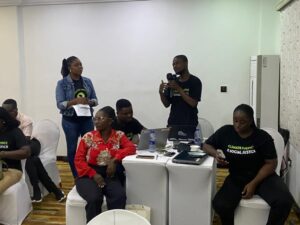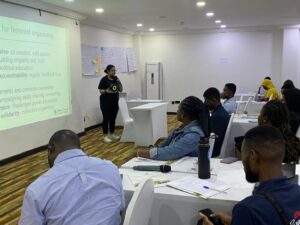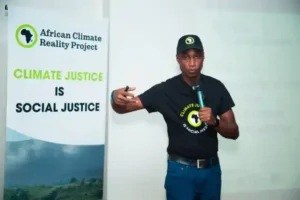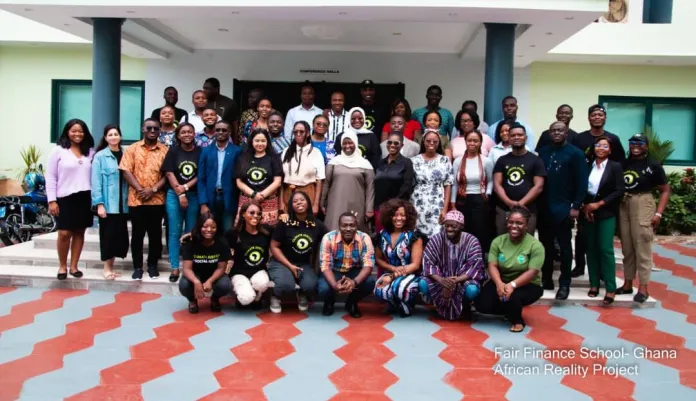Report By: Ishmael Barfi
To ensure sustainable financing of climate solutions, stakeholders in the climate change space have been schooled on the relevance of advocating for fair financing of developmental projects.
The two-day Fair Finance School organized by the African Climate Reality Project (ACRP) in Accra, Ghana brought together young climate leaders, grassroots activists, academics, and civil society organizations to discuss the crucial role of Development Finance Institutions (DFIs) in financing developmental projects.
The Fair School held on 15th-16th July 2024 provided the platform for young Climate Leaders, Grassroots activists, and academics among others to brainstorm on best practices and how best they can engage relevant agencies, and institutions in their quest to ensure resources especially climate financing is judiciously and fairly distributed to tackle climate challenges faced in Ghana and Africa.

Fair Finance School Empowers Climate Leaders to Advocate for Sustainable Financing
The primary objective of the School was to build the capacity of these young Climate Leaders, CSOs, and grassroots activists placing a profound emphasis on a human-centered perspective of finance, underpinned by principles of justice, human rights, and dignity.
Participants at the school were adeptly equipped with actionable strategies to effectively engage with finance-related matters, including harnessing grievance mechanisms as well as cultivating strategic connections with Development Finance Institutions (DFIs)
In addition, they had the opportunity to learn effective advocacy techniques, astute media engagement strategies, and how to craft resonant digital campaign messages in their line of work and address climate-related issues.
Meanwhile, addressing participants, a Senior Campaigner at ACRP, Courtney Morgan reiterated the importance of active participation and strategic questioning in financial discussions.
For her, the active engagement of young people in climate actions can not be underestimated due to youth vibrancy, innovative and energetic spirit, and therefore the need to empower young people to champion the climate action cause, as they possess the commitment and vision needed to impact climate solutions.
“In Africa, where the largest population is young people, these are the individuals with the energy for action and the most innovative solutions for climate action. They are committed, know what they envision for their countries, and if they are the leaders of tomorrow, we want to empower them to be today’s leaders,” she acknowledged.
Adding that, there is a need for grassroots activists, academics, and civil society to have an in-depth knowledge and understanding of climate finance, moving beyond mere numbers and systems.

Senior Campaigner at ACRP, Courtney Morgan addressing participants
This she believes would ensure that climate funds are utilized effectively to benefit affected communities and the citizenry.
“We need to understand why the financing is coming, how it will be disbursed, and the motivation behind it. This understanding allows us to decide whether we want such funding, especially if it comes with harmful conditions like high-interest loans,” Courtney Morgan acclaimed.
The Senior Campaigner at ARCP pointed out that, there are numerous funds available for climate initiatives, and the role of activists is needed during key discussions to articulate the pressing needs and wants of the communities they represent to ensure maximum utilization of these funds for the betterment of the communities.
However, she acknowledged the continent’s disproportionate suffering from climate impacts despite its minimal contribution to the crisis. She called for increased climate finance support from the global north stressing that African communities are inherently resilient and capable of finding context-specific solutions.
She therefore emphasized the need for guidelines to ensure transparency, equity, and accountability in public finance institutions’ activities.
Taking his turn, the Executive Coordinator of the Strategic Youth Network for Development (SYND) Chibeze Ezekiel lamented the lack of responsible financing practices among multinational development banks, he tasked activists to understand the systems at play to address the issue.
Meanwhile, he urged young people to approach climate change issues by identifying business opportunities with activism.
This he noted would aid in their quest to find solutions to numerous challenges as they advocate policies and measures aimed at addressing these challenges.

SYND Executive Coordinator, Chibeze Ezekiel
“Let’s develop business models that address environmental issues while generating economic returns, they can create sustainable livelihoods and contribute to national development”, he echoed.
This approach he explained does not only address environmental issues but also tackles youth unemployment, creating a vibrant ecosystem of young entrepreneurs driving economic growth while combating climate change.
“This dual approach would ensure that their efforts in climate action impact lives and are financially viable, fostering a new generation of environmentally conscious business leaders.
For all the above to take shape, the SYND Executive Co-coordinator Ezekiel appealed to governments to facilitate an enabling environment where young people can showcase their innovations, particularly in environmental sustainability.
He called for collaboration, feedback, and involvement in policy-making processes to ensure environmental considerations are reflected.
Source: www.thenewindependentonline.com








